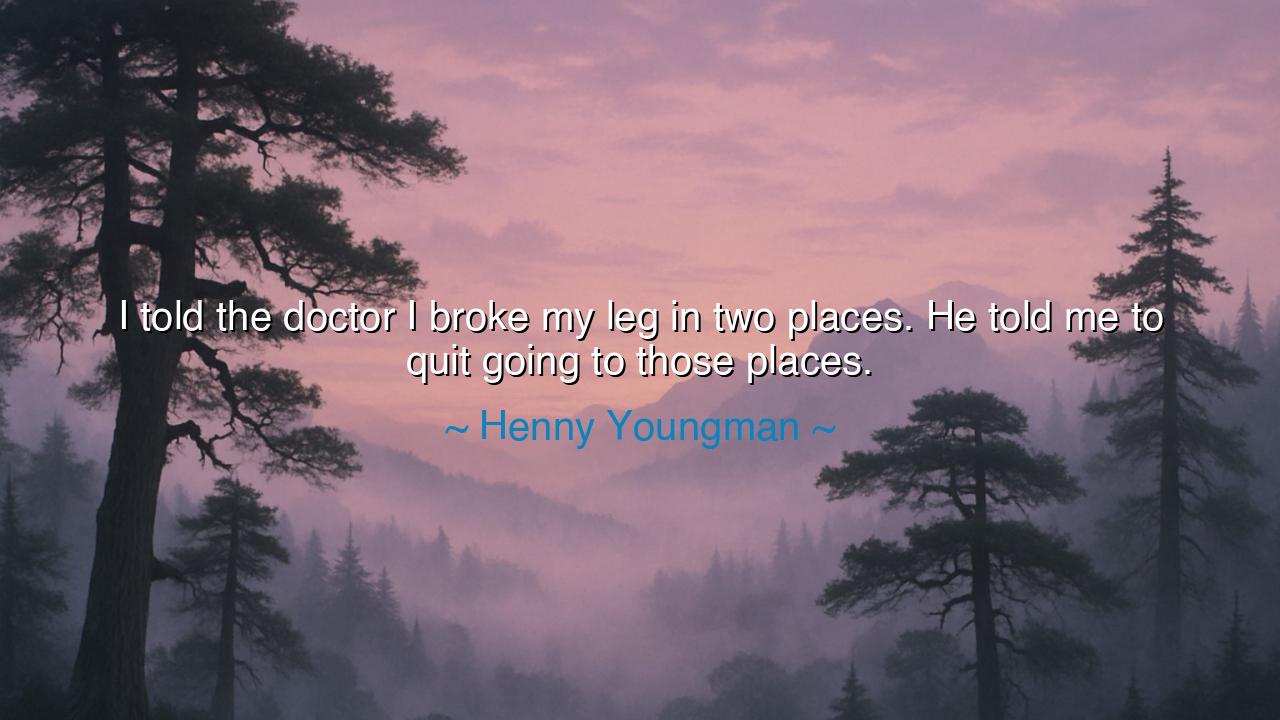
I told the doctor I broke my leg in two places. He told me to
I told the doctor I broke my leg in two places. He told me to quit going to those places.






Hear, O children of laughter and wisdom, the voice of Henny Youngman, master of jest, who proclaimed: “I told the doctor I broke my leg in two places. He told me to quit going to those places.” At first, these words seem but a jest to stir laughter, a play of wit between patient and physician. Yet beneath the humor lies a river of wisdom: that often the troubles we endure are not merely accidents of fate, but the fruit of the paths we choose to walk. The lesson is simple and eternal—if the place brings you harm, do not return to it.
The origin of this saying rests in the world of comedy, where truths too sharp to speak directly are softened with laughter. Henny Youngman, famed for his one-line quips, clothed wisdom in humor so that audiences might laugh, and in laughing, remember. His joke about the broken leg is not a tale of medicine alone, but a parable about human folly: how often we return to the same harmful places, repeat the same mistakes, and then wonder why we suffer. The doctor’s answer, though wrapped in jest, is the counsel of a sage—cease returning to the places of your pain.
Consider, O listener, the story of the Athenians in the Peloponnesian War. Time after time, they launched expeditions into hostile lands, suffering grave losses, yet pride and stubbornness drove them back again. In Sicily, their legions perished, crushed not only by the enemy but by their refusal to learn from failure. They “broke their leg” in the same place twice, and by returning, they sealed their doom. Had they heeded the wisdom in Youngman’s jest, they might have turned their strength elsewhere, and preserved their people.
The humor also teaches us about the human heart. Many men and women, wounded by relationships, habits, or choices, continue to walk the same destructive path. They are like travelers who stumble over the same stone, again and again, never pausing to change their road. Youngman’s doctor speaks with the blunt clarity of truth: if the place brings injury, remove yourself from it. True healing is not only in tending the wound but in changing the journey.
Let us also remember the story of Ulysses, who in his wanderings encountered the island of the Lotus-Eaters. Those who tasted the lotus lost all will to return home. A wise leader, Ulysses pulled his men away, refusing to let them dwell in the place that robbed them of purpose. Had he left them, they would have “broken their leg” there forever, bound to weakness and forgetfulness. Thus, great leaders and wise men learn: avoid the places that break you, even if they tempt you with sweetness or habit.
O children of tomorrow, learn from this jest turned teaching: do not repeat the errors of your past. When life wounds you in a certain path, pause and reflect before you walk it again. Respect the lessons of your own pain. If a friendship brings you only sorrow, let it go. If a habit harms your body, abandon it. If pride drives you into the same folly, humble yourself and turn aside. To heal is not only to mend the wound, but to cease returning to the place of injury.
Practically, let your life reflect this wisdom. Keep watch over the “places” in your life—habits, people, choices—that wound your spirit. Have the courage to leave them behind, no matter how familiar or comfortable they may seem. Seek new paths where growth, health, and joy await. And when you stumble, do not laugh at your fate alone—laugh, and then learn. Humor, like Youngman’s, is a lantern: it brightens the darkness, but it also points the way.
Thus, his jest endures not only as comedy but as counsel: “Quit going to those places.” Laugh at it, yes—but also live by it. For the wise man does not return to the pit that swallowed him, nor the stone that tripped him. He learns, he rises, and he walks a new road, until at last he finds wholeness.






AAdministratorAdministrator
Welcome, honored guests. Please leave a comment, we will respond soon